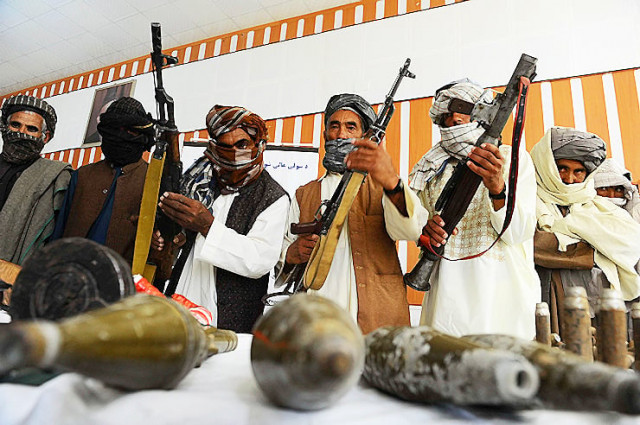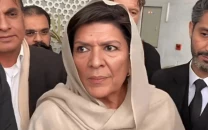Afghan peace negotiators pin high hopes on Pakistan visit
The Pakistani Foreign Ministry insists Kabul has not yet officially contacted Islamabad for the peace council’s visit.

Afghan Taliban on their part have clarified that no “prisoner” can represent them and any move to “force prisoners to meet enemies will amount to an exercise in futility.” PHOTO: AFP/FILE
Prime Minister Nawaz Sharif had accepted a proposal by Afghan President Hamid Karzai at the trilateral summit hosted by British Prime Minister David Cameron in London late last month to allow members of the High Peace Council to meet Baradar, Karzai office had earlier stated after the summit.
The High Peace Council met in Kabul on Saturday and discussed the agenda for the upcoming visit to Pakistan, a member of the council told The Express Tribune by phone from Kabul on Sunday. The member requested not to be identified by name as he was not authorised to share details with the media.
“The meeting decided to travel to Pakistan this month with a broader peace agenda,” the council member said. He said the council’s members were agreed that the visit should not be limited only to a meeting with the Taliban leader. The council’s chairman Syed Salahuddin Rabbani is likely to lead the delegation, he said.
The Pakistani Foreign Ministry insists Kabul has not yet officially contacted Islamabad for the peace council’s visit. However the peace council member says the visit has been planned and they expect good results following Pakistan’s enhanced commitment to Afghan peace at the London summit.
Afghan Taliban on their part have clarified that no “prisoner” can represent them and any move to “force prisoners to meet enemies will amount to an exercise in futility.”
A Taliban leader told The Express Tribune that the group, as per policy, does not give any responsibility to former prisoners and the same policy has been adopted in the case of all freed Taliban prisoners.
The killing of Pakistani Taliban chief Hakimullah Mehsud and the appointment of Fazalullah as the new chief had raised concerns over the possible negative impact on the Afghan peace process especially as Fazalullah is based in Afghanistan. Islamabad had on a number of occasions formally conveyed concerns to the Afghan government over the presence of Pakistani Taliban fighters on Afghan soil.
Afghan Foreign Ministry Spokesman Janan Mosazai says “We are hopeful that the killing of the TTP chief and nomination of their new leader will not affect the proposed visit to Pakistan of the High Peace Council and the implementation of decisions taken during the London trilateral summit”.
“Our contacts with Pakistani officials for pursuing the agreement following the summit are positive. We are satisfied and hopeful that the talks will produce positive results,” he said.
Mosazai said Kabul will back Pakistan’s policy of holding peace dialogue with their armed opponents (Taliban) to find out a political solution as “we want to end the war in Afghanistan and are also pursuing the path of peace with the (Afghan) Taliban and the peace council is taking the process forward.”
The spokesman evaded a question when asked on Pakistan’s stance that Fazalullah operates from Afghan soil and said, “it will be unjustified to say that Afghanistan has allowed terrorists or extremists on its soil and particularly those who launch attacks or harm its neighbours.”
Kabul has never officially admitted the presence of the Pakistani Taliban on its soil. However, it has arrested the TTP deputy chief Maulvi Faqir in eastern Afghanistan. In November 2009, Fazalullah had told the BBC Urdu that he had safely arrived in Afghanistan and since then Pakistani security officials had been accusing him of launching series of attacks on its border posts.
Pakistan, on a number of occasions, has officially sought extradition of Fazalullah, who has regrouped his dreaded Swati fighters in Afghanistan’s mountainous eastern Nuristan province.
“We have shared dossiers on Fazlullah both with the Afghan government as well as ISAF. We are intensively engaging both sides to take care of this issue and hope that some action will be taken,” Pakistan’s foreign ministry had stated earlier.
Kabul expects cooperation from Pakistan but at the same time Afghan authorities will have to address Islamabad’s concerns about activities of the Pakistani Taliban on Afghan soil.
Published in The Express Tribune, November 18th, 2013.



















COMMENTS
Comments are moderated and generally will be posted if they are on-topic and not abusive.
For more information, please see our Comments FAQ